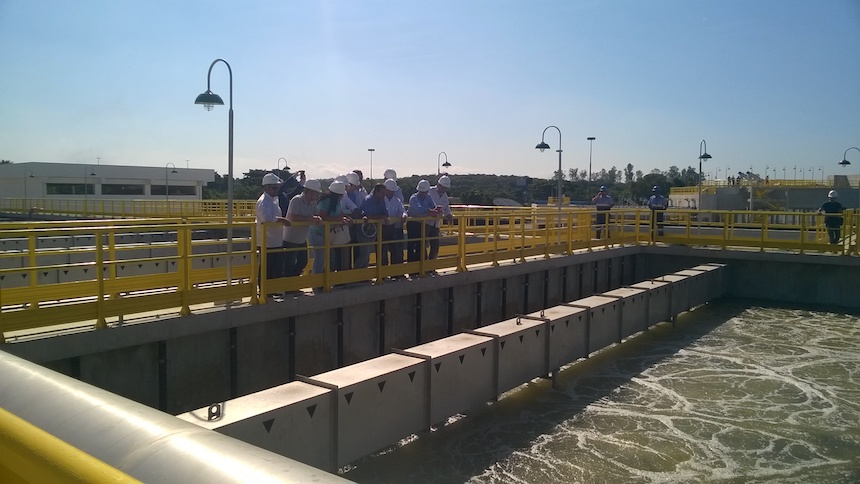
We are all too familiar with these figures: on average, only 50% of the population in Latin America is connected to sewerage and 30% of those households receive any treatment. These figures are not new. The region has been lagging in the levels of wastewater treatment for decades, which is unacceptable considering its high levels of urbanization and income levels.
The region is also not homogenous. There is a large disparity in the levels of treatment per country: we see countries like Chile, which treats 90% of its wastewater, and countries like Costa Rica, which treats approximately 4% of its wastewater.
We had hoped that closing this gap was achievable under the Millennium Development Goals (MDGs). The MDGs called for halving the proportion of the population without sustainable access to basic sanitation between 1990 and 2015. In 1990, 80% of the urban population in the region had access to improved sanitation facilities, which means a connection to a piped sewer, septic tank, or pit latrine. By 2011, this percentage rose to 87%, which represents significant progress considering the increase in the urban population from 311 million (70% of total population) to 469 million (80% of total population) over the same period. Nevertheless, , mainly the extreme poor living in urban slums and peri-urban areas. Moreover, there is no guarantee that on-site sanitation facilities are functioning properly. These sanitation “hot-spots” not only pose a public health hazard and quality of life issue for affected households, but also for the broader community due to the ease with which water- and excreta-related diseases are transmitted.
The newly endorsed Sustainable Development Goals (SDGs) are adding a new dimension to our challenges in the sector by incorporating sustainability, which includes improving water quality, implementing integrated water resources management, water use efficiency across sectors, reducing the number of people suffering from water scarcity, and restoring water-related ecosystems. The ability to significantly increase the levels of wastewater treatment becomes necessary if we are to achieve the SDGs, and should be a priority for the governments in the region.
with the hope that most middle-income countries in the region will achieve at least 50% wastewater treatment rates over the next decade. The investment requirements to achieve this are enormous. The Development Bank of Latin America (CAF) estimated that over the period 2010-2030, US$80 billion will be spent on sewerage infrastructure and US$33 billion on wastewater treatment. Historically, investments in the sector have focused on water supply and relatively little has been invested in sanitation.
Efficiently investing in wastewater and other sanitation infrastructure to achieve public health benefits, environmental objectives, and to enhance the quality of urban life is a major challenge for the region and this is highlighted in a recent report prepared by the World Bank on infrastructure in Latin America which states that ‘the dismal wastewater performance is a real emergency, and one that epitomizes the potential for spending better’.
To address these challenges, the World Bank is implementing a new regional activity to provide client countries with the analysis and guidance on improved strategies for the planning and financing of wastewater treatment, resource recovery, and water quality improvement investments and associated trade-offs in a river basin context. This initiative will contribute to a larger dialogue that has started with regional development banks, like the Inter-American Development Bank and the CAF, and with clients in the region, and which aims to launch a strategic vision during the World Water Forum in Brazil in 2018.
Additionally, the World Bank continues to invest in wastewater treatment and promoting a more integral approach to pollution control, like in a recently approved operation in Panama, and looking at ways of increasing the financial sustainability of wastewater treatment plants by incentivizing energy recovery, as in current analytical work being undertaken in Argentina. These are just a few examples that illustrate the shift in the mindset on this topic.
. The region will continue to urbanize and the competition for water resources is increasing. Climate change, natural disasters and extreme weather events are affecting the ability of existing infrastructure to deliver services. Rainfall variability and prolonged water stress threaten water supply in many parts of the region. Areas in the Amazon basin, northern Mexico, northeast Brazil, the Pacific coasts of Chile and Peru, and countries in the Caribbean and Central America show a consistent drying trend that is expected to persist. In areas of scarcity, wastewater (including storm-water) reuse and treatment are an additional and important source of supply.
But recent advances in the sector present an opportunity to conduct basin-wide planning that promotes investments in wastewater that clearly identifies the downstream benefits of upstream investments, hence maximizing returns. These investments need also to be designed to protect the environment and reduce greenhouse gas emissions. It is furthermore an opportunity to reduce resource consumption along the water value chain and to shift from a linear to a circular economy. Affordable technical solutions abound and the opportunity to scale up and leap frog to new technology investments is a reality.
The region must embrace these opportunities under a common vision and . Stay tuned for more as we implement our new efforts in the region to shift the way that we think and invest in wastewater.
– Diego Juan Rodriguez, Senior Economist at the Water Global Practice of The World Bank Group.
